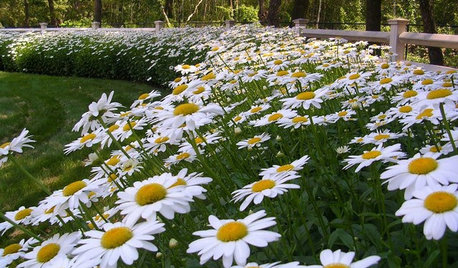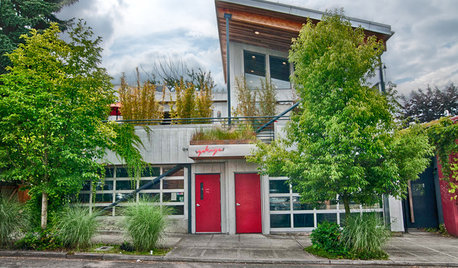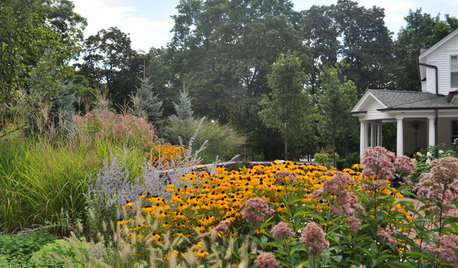fertilizing organic potting mix
west9491
13 years ago
Related Stories

GARDENING GUIDESGet on a Composting Kick (Hello, Free Fertilizer!)
Quit shelling out for pricey substitutes that aren’t even as good. Here’s how to give your soil the best while lightening your trash load
Full Story
GARDENING GUIDESHow to Switch to an Organic Landscape Plan
Ditch the chemicals for a naturally beautiful lawn and garden, using living fertilizers and other nontoxic treatments
Full Story
GARDENING GUIDESCommon Myths That May Be Hurting Your Garden
Discover the truth about fertilizer, soil, staking and more to keep your plants healthy and happy
Full Story
GARDENING GUIDESHow to Keep Your Citrus Trees Well Fed and Healthy
Ripe for some citrus fertilizer know-how? This mini guide will help your lemon, orange and grapefruit trees flourish
Full Story
SPRING GARDENINGHow to Grow a Rose Garden in Pots
Everything can come up roses, even without a plot of soil in sight. This step-by-step guide to growing roses in containers shows you how
Full Story
HOUZZ TOURSHouzz Tour: Mixing It Up in a Century-Old Edwardian
Different eras, patterns and textures mingle beautifully in a Canadian interior designer's home and 'design lab'
Full Story
GARDENING GUIDESMix or Mass Daisies for Two Great Garden Looks
The classic daisy looks equally beautiful massed in borders or mixed throughout a naturalistic planting. Which look suits your style?
Full Story
HOUZZ TOURSMy Houzz: Mixed-Use Oregon Home Serves and Charms
Home, restaurant, garden, rental cabin — and it gives back to the community too. This multitasking home is a wonder in more ways than one
Full Story
HOUZZ TOURSMy Houzz: Vintage and Asian Styles Mix in Eclectic Home
An interior design couple dress up their home with origami pendant, wallpaper and mid-century pieces
Full Story0

GARDENING GUIDESPacific Northwest Gardener: What to Do in September
Put in cool-weather veggies, fertilize your lawn and tidy the garden this month before chilly weather arrives
Full Story






prestons_garden
burra_maluca
Related Professionals
Broomfield Landscape Contractors · Dudley Landscape Contractors · Fairfield Landscape Contractors · La Verne Landscape Contractors · Mission Landscape Contractors · Streamwood Landscape Contractors · Shenandoah Landscape Contractors · Brentwood Los Angeles Outdoor Lighting & Audio Visual Systems · Alvin Decks, Patios & Outdoor Enclosures · Crystal Lake Decks, Patios & Outdoor Enclosures · Mebane Decks, Patios & Outdoor Enclosures · Norman Decks, Patios & Outdoor Enclosures · Richmond Decks, Patios & Outdoor Enclosures · Salisbury Decks, Patios & Outdoor Enclosures · Melvindale Stone, Pavers & Concretetapla (mid-Michigan, USDA z5b-6a)
prestons_garden
tapla (mid-Michigan, USDA z5b-6a)
west9491Original Author
burra_maluca
tapla (mid-Michigan, USDA z5b-6a)
Dan _Staley (5b Sunset 2B AHS 7)
burra_maluca
prestons_garden
tapla (mid-Michigan, USDA z5b-6a)
burra_maluca
alabamanicole
anney
tapla (mid-Michigan, USDA z5b-6a)
anney
nandina
greenguy1956
tapla (mid-Michigan, USDA z5b-6a)
greenguy1956
gardengal48 (PNW Z8/9)
Dan _Staley (5b Sunset 2B AHS 7)
tapla (mid-Michigan, USDA z5b-6a)
Dan _Staley (5b Sunset 2B AHS 7)
burra_maluca
greenguy1956
tapla (mid-Michigan, USDA z5b-6a)
rdak
prestons_garden
nancyanne_2010
gardengal48 (PNW Z8/9)
Dan _Staley (5b Sunset 2B AHS 7)
anney
nancyanne_2010
gardengal48 (PNW Z8/9)
tapla (mid-Michigan, USDA z5b-6a)
prestons_garden
beneficial_nematoad
tapla (mid-Michigan, USDA z5b-6a)
Dan _Staley (5b Sunset 2B AHS 7)
end3
greenthumbgrowing
tapla (mid-Michigan, USDA z5b-6a)
DrHorticulture_
prestons_garden
Dan _Staley (5b Sunset 2B AHS 7)
tapla (mid-Michigan, USDA z5b-6a)
end3
jnfr